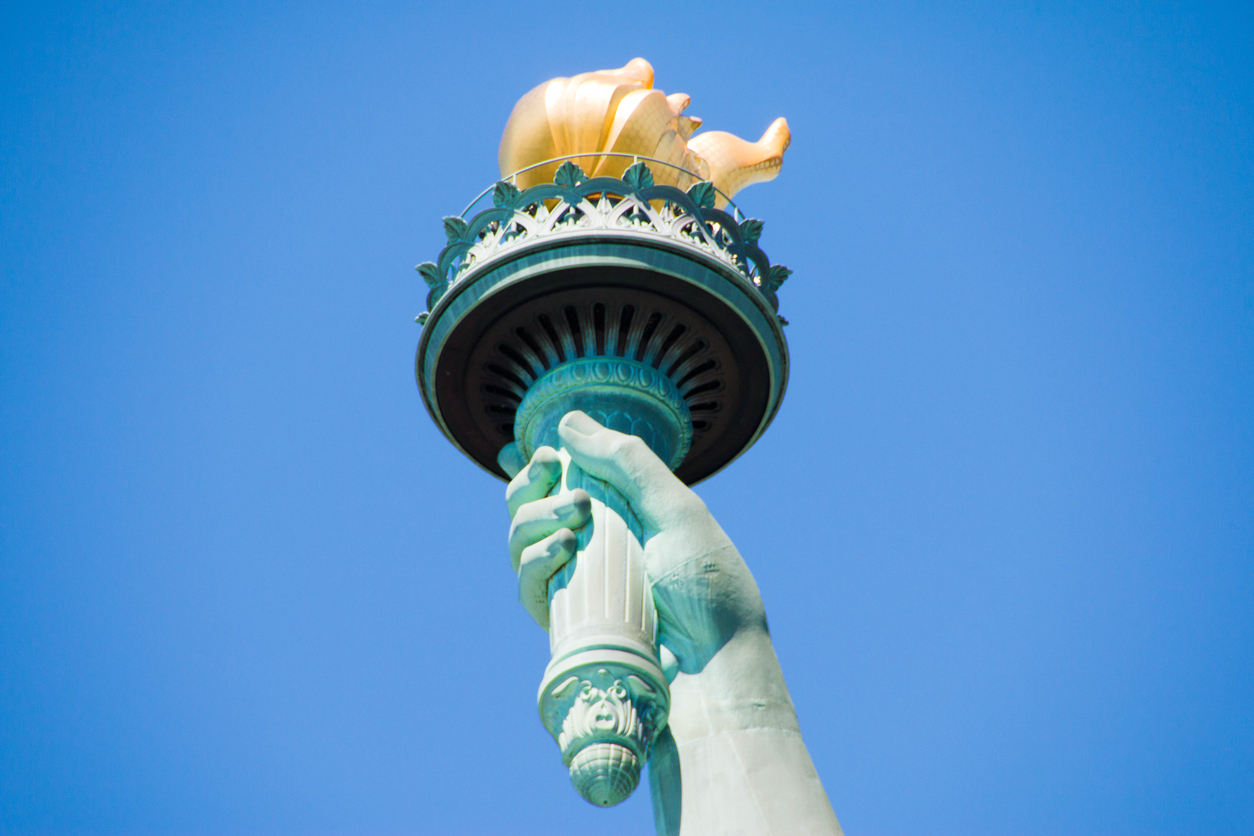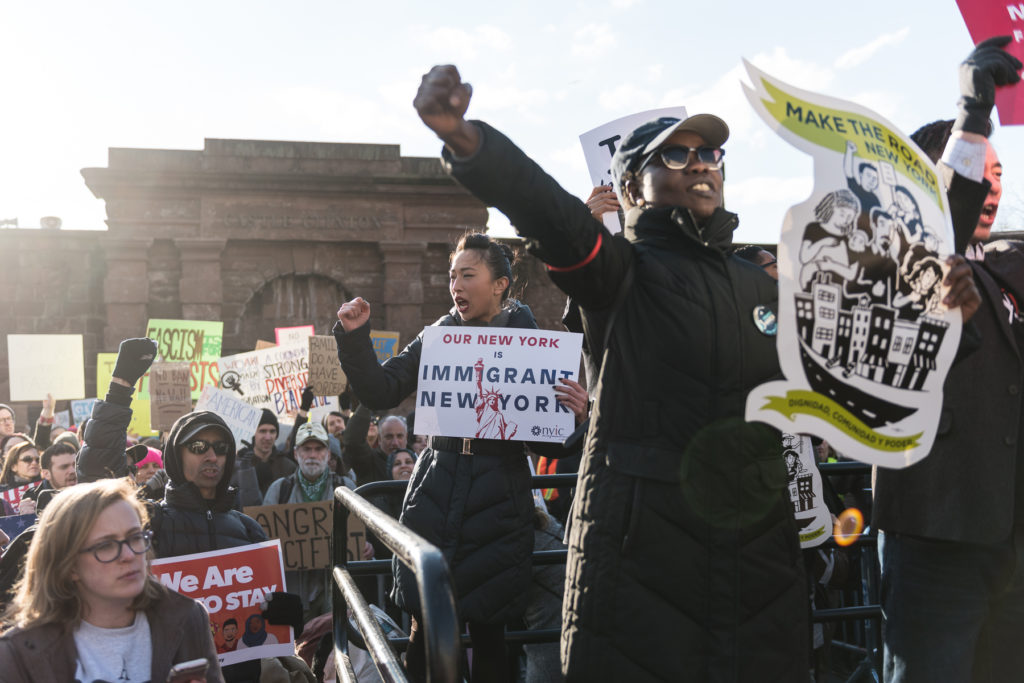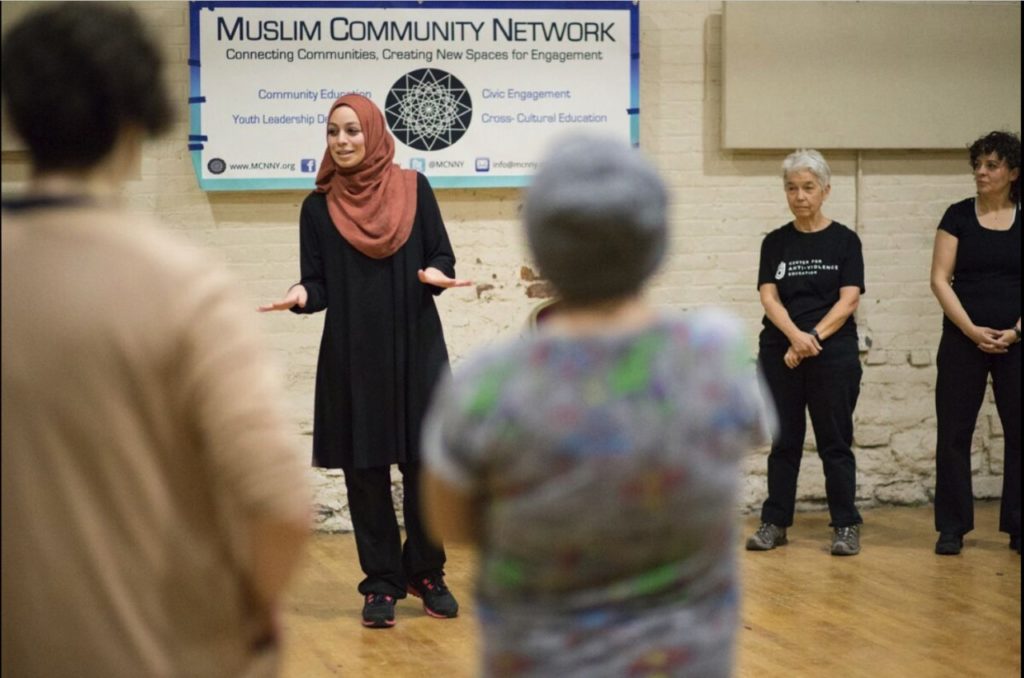
Defending Immigrants’
Rights
Defending Immigrants’
Rights
Ongoing and rapid-response grants help protect New York City's immigrant community at a time of enormous uncertainty.
If there is any city that typifies the “melting pot” that is America, it’s New York City – more than 3 million of its 8 million residents were born in another country. For decades, supporting this tradition of welcoming immigrants to our shores has been a core mission of The New York Community Trust. After the passage of 1986 Immigration Control and Reform Act, for example, we created the Fund for New Citizens, which provided support for the estimated 100,000 New York newcomers who benefitted from the law.
Throughout the years, we have worked to ensure that our nation’s aspiring citizens have the support they need to build better lives for themselves and contribute to our country.
This mission is more important than ever today.
In the wake of one of the most divisive presidential campaigns in history – one that was filled with talk of mass deportations, a Muslim ban, and repeal of the Affordable Care Act – New Yorkers awoke on Nov. 9 filled with uncertainty and fear. The subways were eerily subdued. People were wondering: Will I be deported? Will hate crimes continue to rise? Will I lose access to health insurance? Not only is New York home to one of the country’s largest Muslim populations, but more than 3.2 million City residents—38 percent—are on Medicaid.
Three million of New York City's 8 million residents were born in another country.
Few people knew which campaign promises were real and which were merely political rhetoric, but New Yorkers’ fear was very real. In the months between the election and the inauguration, undocumented immigrant parents, fearing deportation, were figuring out who could be guardians for their children. Fahd Ahmed, Executive Director of Desis Rising Up and Moving (DRUM), heard from members who were afraid to leave their homes, even to work as street vendors or day laborers. Muslims—and people who looked Muslim—were verbally and physically assaulted. And even more people were signing up for health insurance through New York State’s health exchange for fear of otherwise losing access.
Accurate information about legal rights and options can quell anxiety, and knowing you have allies can create a sense of security. Philanthropic support can provide both. Earlier this year, The New York Community Trust and the New York Foundation joined forces to create the Liberty Fund, aimed at protecting, educating and advocating on behalf of New York City’s vast immigrant population and other New Yorkers affected by anticipated federal policy changes. The Jerome L. Greene Foundation and three of The Trust’s individual donors also pitched in, for a total of $1 million. Its efforts are supplementing the work of the existing Fund for New Citizens, which has enjoyed the support of 33 foundations and other donors during its thirty years and has made almost $27 million in grants to community groups and legal service organizations that support immigrants. Through a streamlined application process administered by The Trust, the Liberty Fund made grants to 21 nonprofits in just a few weeks. Even before changes to federal policies were announced, Liberty Fund contributors were helping nonprofits be prepared—and strong. The Trust also reminded the City’s nonprofits and the communities it’s supported for decades that our help is unwavering.

Courtesy of The New York Community Trust
Among the top priorities of these initiatives is education and awareness. For example, several Liberty Fund grantees, including the Immigrant Defense Project, Make the Road New York, African Communities Together, Chhaya Community Development Corporation, and MASA Mex-Ed, are presenting “know-your-rights” workshops in immigrant communities. These efforts are supplementing the grants and technical assistance provided by the Fund for New Citizens to make immigrant community groups stronger—teaching them management, fundraising, and technology skills. As a result, Africans, Mexicans, Pakistanis, Chinese, Haitian, and other newcomers from around the world can turn to a network of frontline service organizations for help and trusted advice.
A second priority of our grantmaking is advocacy and organizing. For example, among the recipients of the Liberty Fund’s rapid response grants is DRUM, which is establishing hate-free zones in four Brooklyn and Queens neighborhoods. And to help those less directly affected defend their neighbors, Hollaback! is offering bystander training, while #GetOrganizedBK is organizing residents of gentrified Brooklyn neighborhoods to advocate for human and civil rights.
A third critical priority is immigrant defense, which has long been a central focus of our overall grantmaking. For individuals facing deportation, for example, the Fund for New Citizens has supported the Immigration Representation Project since 1992. Its partners include Catholic Charities, Human Rights First, Legal Aid Society, and, in its earliest years, the Hebrew Immigrant Aid Society. Together they provide comprehensive screenings for immigrants in deportation proceedings and pro bono legal representation to many of them. It is the longest-running screening project of its kind in the country; space is provided at the New York Immigration Court for the interviews and for legal teams to evaluate cases for representation.

Courtesy of The New York Community Trust
The Trust and its Fund for New Citizens have a history of responding quickly to changes in immigration policy. In late 2002, for instance, when a special registration program was established for male immigrants from 25 predominantly Middle Eastern countries, the Fund made grants to four legal service providers to help New Yorkers understand the program. In 2010, when a devastating earthquake hit Haiti, the federal government granted Temporary Protected Status to Haitians who were in the United States at the time. The Fund made timely grants to a number of organizations to ensure that more than 2,200 Haitians applied for this status.
Likewise, the Fund launched a grant program to ensure that young immigrants understood and could apply for Deferred Action for Childhood Arrivals (DACA), announced by President Barack Obama in 2012. This program allows young, undocumented immigrants who came to the United States with their parents live and work without fear of deportation for two years, with the possibility of renewal—a benefit that thousands of New Yorkers received.
The next several years will continue to bring uncertainty for America’s new and aspiring citizens. But we are certain of one thing: that the New York Community Trust will be there to provide the information, advocacy and services that families deserve and need.
Shawn V. Morehead is Program Director of Promising Futures at The New York Community Trust.
Project
Liberty Fund and Fund for New Citizens
Philanthropy
The New York Community Trust


